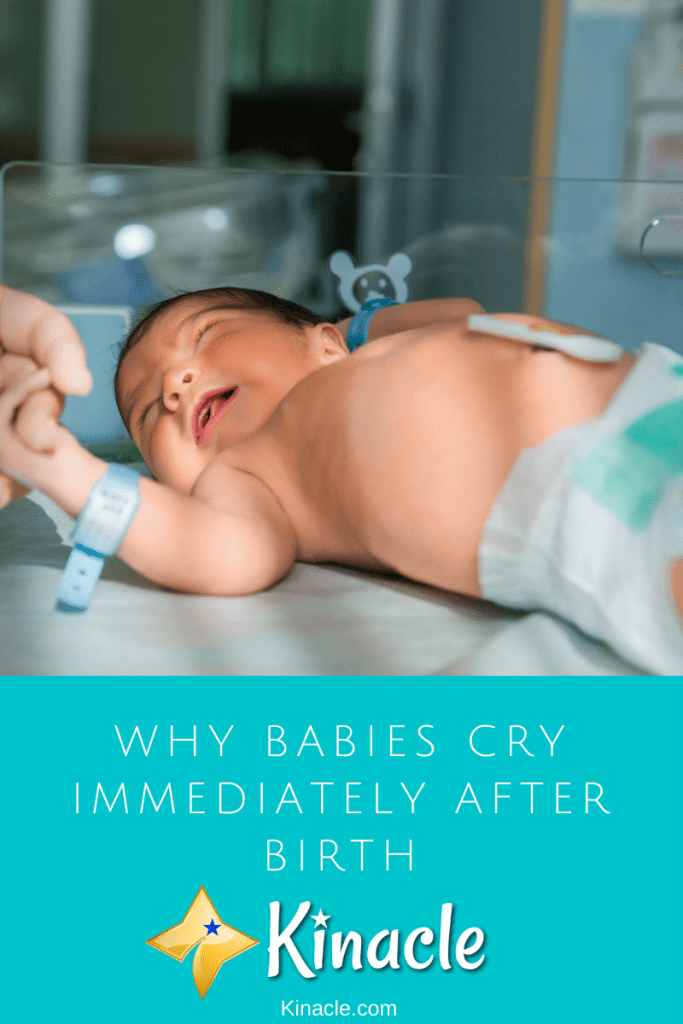
Crying is a form of communication among babies. While they are still learning how to communicate verbally, babies cry to get what they need and tell others that they feel uncomfortable. This makes us wonder, is it also the same reason why a baby cries after birth? If not, could there be a more serious reason behind this crying?
Why do babies cry immediately after birth?
The reason why babies cry soon after birth is associated with their first breath. While inside their mother’s womb, babies do not breathe on their own. They get the oxygen from their mother’s bloodstream through their umbilical cord that is attached to the placenta. Unborn babies have specialized blood pathways that send more blood away from the lungs. During this time, their lungs are not yet needed for the exchange of oxygen and carbon dioxide.
After delivery, a newborn’s umbilical cord is clamped and cut near the navel. This stops the flow of oxygenated blood from their mother. It is also done to prepare the baby from the detachment and delivery of the placenta right after.
Due to the demand in oxygen, babies will normally gasp for air from the environment and they do this by crying. The sudden shift in the temperature from the warmth inside the womb to the colder environment will also trigger crying. Crying helps push the fluids in their lungs up to the more reachable surfaces where these fluids can be suctioned like the nose and mouth. Most importantly, the change in pressure as babies cry and take their first breath will inactivate the previous blood pathways and activate the blood vessel connections in the lungs. This will help newly born babies breathe using their lungs where the exchange of oxygen and carbon dioxide takes place.
Do all babies cry at birth?
Most babies cry after birth, but every baby doesn’t react the same way. This is the reason why babies are being evaluated upon birth using APGAR scoring.
APGAR scores are taken 1 minute and 5 minutes after the baby is born. APGAR test helps evaluate a baby’s health status in five categories:
- appearance or skin color
- pulse or heart rate
- grimace or reflex
- activity or muscle tone
- respiration or breathing
Each of these five categories will be scored from 0 to 2, which totals to an APGAR score of 10.
In the breathing or respiration category, 2 points are given for a baby with a good or strong cry. 1 point is given for a weak, irregular, or slow cry. 0 point is given to a baby who did not cry even after stimulation.
Healthy babies usually score 7 to 10, those who scored 5 to 7 may need some medical assistance like oxygen therapy, while babies who scored lower than 5 will need prompt medical intervention and medications.
What if my baby is not crying after birth?
In some babies, crying after birth may sometimes be delayed. Premature babies and those who are born via emergency Cesarean section are more likely to exhibit delayed crying.
The attending doctor or nurse may gently stroke, pat, or massage the baby to stimulate crying. This will help expel the excess amniotic fluid and mucus in the baby’s lungs and airways to facilitate breathing.
Babies who don’t cry and breathe after stimulation will need urgent medical attention because it may indicate newborn asphyxia. This condition results from an insufficient amount of oxygen before, during or after a baby is born. If regular breathing isn’t started within a minute after birth, the baby’s brain and tissues will be compromised due to a lack of oxygen in his blood.
For a baby not crying after birth, the health care team may give supplemental oxygen to directly deliver it to his lungs. It is usually administered via an oxygen mask that is worn over the baby’s face. Most babies respond well to oxygen and start breathing on their own after a few minutes.
However, in rare cases, babies who can’t breathe naturally will need to be assisted using a tube that will be inserted in his windpipe. Medications to support the baby’s heartbeat may also be given through one of the veins in his umbilical cord. After that, the baby will be carefully monitored under an intensive care facility that is specialized for newborn care.
Conclusion
Overall, babies cry after birth to facilitate breathing. Crying immediately after birth is a good indicator of healthy lungs and airways. However, some babies may have delayed or absent cry and these babies need special attention from the medical team. So if your baby cries out loud after you gave birth, don’t worry much. Your baby is simply telling everyone that he’s perfectly healthy and ready to face the challenges of his new environment.
Leave a Reply